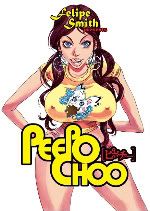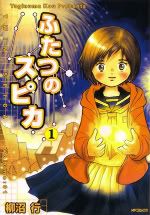Interview: How Vertical Owned the NYAF
 In an effort of oversimplifying everything I do, I tend to find one anime or manga company to point out in a blog post and declare my clear “winner” of every major convention I go to. Past winners have included Yen Press at the New York Comic Con in 2008, Bandai Entertainment in Otakon 08 and again in ’09, and FUNimation at the New York Anime Festival last year.
In an effort of oversimplifying everything I do, I tend to find one anime or manga company to point out in a blog post and declare my clear “winner” of every major convention I go to. Past winners have included Yen Press at the New York Comic Con in 2008, Bandai Entertainment in Otakon 08 and again in ’09, and FUNimation at the New York Anime Festival last year.
But my winner of the NYAF this year came completely out of left field. Vertical Publishing has never been a particularly exciting company to watch at these cons. Their focus on classical manga and non-manga Japanese publishing seemed to be disconnected with the convention audience, and I honestly did not consider them part of the same industry as Del Rey or Yen Press.
And then a few months ago, they hired manga expert Ed Chavez as their new marketing director, and immediately things started changing for the small publisher. At the NYAF, we finally got to see what the future of Vertical was going to look like with Chavez on board. They announced four new manga acquisitions, including the experimental Peepo Choo and the highly anticipated Chi’s Sweet Home. This was arguably the most exciting news to come out of that weekend.
To learn more about how Vertical managed to make such an amazing appearance at NYAF this year, I spent some time interviewing the man himself, Ed Chavez:
* * *
We have never had a Vertical panel like that before. We were used to hearing about classical manga, Japanese prose, cookbooks, sudoku, and cute animal craft books, but never so many modern manga titles like this.
Was this the company’s plan when they hired you? Were they aiming to change their manga division?
Yes. That was part of Vertical’s plan way before I started working for them.
I ran into [Vertical’s Editorial Director] Ioannis at the Takehiku Inoue event when Kinokunya opened in New York in fall 2007, almost two years ago. I was not with Vertical at the time, I was with CMX. We were talking about Tensai Bakabon, a classic title from the 60’s, and he pulled me aside to tell me, “We’re finally getting close to expanding our manga division, we’re just looking for a core partner in Japan.”
For two years now they’ve been trying to find that partner to grow in the manga market, and unfortunately, we still don’t have one yet. But now that I’m around, we have much better connections to Japanese publishers and we’re able to twist their arms a little better to acquire new titles. That’s what I do, my background and my connections are all in manga.
Have your manga connections to Japanese publishers helped Vertical with acquiring new prose or sudoku titles?
I wouldn’t really say I’ve helped with the sudoku part, because that division sort of runs itself. But when it comes to the prose, yes, strangely enough.
You haven’t seen it yet, but Ioannis and I are preparing to launch a line of Japanese light novels in America, expanding on the success we’ve had with the Guin Saga. I’ve also been helping them in acquiring future criticism and non-fiction books.
I wear a lot of hats. Because I’m willing to experiment a lot and have a decent understanding of the Japanese language, I’m able to help Vertical out in many different areas, not just with their manga. So working with light novels and non-fiction along side the manga is great because it keeps me sane.
 Now let’s talk about the new manga announcements. As a personal friend of Felipe Smith, do you know if he was shopping around Peepo Choo to other American publishers or did you approach him first?
Now let’s talk about the new manga announcements. As a personal friend of Felipe Smith, do you know if he was shopping around Peepo Choo to other American publishers or did you approach him first?
As far as I know, they were shopping Peepo Choo around to American publishers. When I had lunch with him in Japan some time ago, he was telling me that they were trying to get a New York manga publisher to pick it up at that time.
In a recent message posted by Smith on YouTube, he appeared to be a little pessimistic about his work being released in America.
Yeah, and that was only a month ago! [laughs]
Do you think he was expecting Peepo Choo to be released in America at that point?
I think he was expecting it to happen one day, but even as an American artist, it was much easier for him to get work published in Japan than it would be for him to get work published in America. But something like that just doesn’t make sense. It really shouldn’t be that way.
Did his former American publisher Tokyopop enter in the picture at any point, or had that relationship sour for Felipe? His first OEL manga, MBQ, didn’t seem to be marketed well over here.
I really can’t speak about Tokyopop’s policy or how they handled MBQ, but we at Vertical are going to make an effort for Peepo Choo to do well here in America.
We’re taking a lot of risks and resources in importing the title back to America, and we’re confident that it will pay off. We’re also going to try to fly him back to the US to attend the major comic cons and promote himself that way. We’re even going to try to pitch the title to Hollywood on his behalf.
We are serious about this and we are going to put a lot of effort in him. Is that any different than what Tokyopop was offering him? I can’t say. But I hope that he decided to go with us over the other publishers because he trusts us to treat him and his series properly.
I really like the idea of Peepo Choo, and I really think he’s improved as an artist since MBQ. Ioanni feels just as strong about the title as I do. It actually wasn’t on the top of our list for titles to acquire as I was more focused on getting Chi at the time. But Ioannis really pushed for the deal to happen, and we ended up getting both series.
Of all the artist to have emerged from Tokyopop’s OEL division, I felt the two most talented were Svetlana Chmakova (Dramacon, Nightschool) and Felipe Smith. He had such a bold style and an amazing voice.
Yeah, and he really has improved so much as an artist since his Tokyopop days, it’s almost shocking. I’m almost curious to see how American fans will react to Peepo Choo when we release it because it so bold and over-the-top. That’s the beauty of it. It’s not a comic, it’s not manga… it’s Peepo Choo!
What were your connections to Chi’s Sweet Home?
 When I was in Japan, I did a little work with Morning magazine, the magazine that Chi is published in. I’ve been a fan of the title for a while. Being around Morning, I actually got to meet and spend time with the editor of Chi.
When I was in Japan, I did a little work with Morning magazine, the magazine that Chi is published in. I’ve been a fan of the title for a while. Being around Morning, I actually got to meet and spend time with the editor of Chi.
While we were having dinner together, we discussed Chi and how to approach it in the US if it ever were to be released over here. Having that conversation back in Japan some time ago made things a little easier for me later on, but that wasn’t necessarily the final blow.
When we made our presentation of how Vertical would handle the “flipping” of Chi, I made sure that everything was just as we discussed back in Japan. And once the artist, Konami Kanata, saw Vertical’s version, she wasn’t just happy to give it to us, she actually liked it a lot more than she thought she would.
And that’s good because another publisher was trying to license it and they also presented their flipped version to Kanata. But she rejected their version, so I guess we just did it better.
By releasing it in color and flipping it “American” style, you’re obviously not going for the regular manga reader. Who are you aiming this series towards?
Everybody, not just the manga readers. We’re targeting it to the comic book readers, we’re targeting it to the Garfield fan, we’re targeting it to the person who reads Cat Fancy, we’re targeting it to that three-year-old that can’t really read yet, to that three-year-old’s mom, that mom’s grandma… We want everyone to read Chi!
That’s the funny thing about Chi. My girlfriend loves Chi, and she doesn’t read any Japanese. I didn’t even introduce her to Chi because she doesn’t like manga or anime, she finds most of it repulsive.
But she found Chi on the internet because she’s a crafts maker and she saw a lot of people making paper crafts and little toys from the comic. And once she started seeing the cartoon on Crunchyroll, she started hunting down the manga on her own, then she forced me to translate every chapter for her.
That’s the range of Chi. There are people who have never seen the manga before, but they’re still fans of this little kitty. I want to get every single one of them, and I want to make it accessible to every single one of them, so that’s the reason for flipping it.
The color is a bit of a bonus. If you read it in the magazine, it’s in black-and-white, but if you read it in the graphic novel, it’s in color. That’s really just a bonus feature for the fans, so keeping it in the English version is also our little gift to the fans.
I know that hardcore manga fans are not going to be too happy that it’s flipped, so we hope the color makes up for it.
Any plan of expanding the Chi branding with merchandise outside of the book?
I want to. We literally just got the license the other day, so we only have the manga for now. We’d have to go through the whole process again for merchandise.
But we’ll look into it. Our biggest concern first would be what the fees are going to be, because we’ve never done merchandising before. Books are tricky enough to manage with cost and risk of returns. But we’ve never done merchandising, so I don’t know what that means as far as returns and cost of materials.
If we do get the merchandising rights, it’s not going to happen soon. We need to have the capitol to make the toys. But if Chi takes off, it will make it VERY easy for that to happen.
 And what was the motivation behind the other two acquisitions, Needle and Twin Spica?
And what was the motivation behind the other two acquisitions, Needle and Twin Spica?
The real motivation behind that was my bosses. As soon as I started to work at Vertical, they said, “We trust that you know your manga, and we don’t think anyone else in the US knows that content as much as you do. You know the big names, the small names, the unknown, the self-published… So since all the big publishers are tied up with other American publishers right now, where can we find a catalog?”
So I had to look at really small publishers, publishers that only release like one or two manga magazines, and indie publishers.
We got Needle and Twin Spica from Media Factory, a publisher that hasn’t really done a lot of business in America outside of light novels and anime. Our Guin Saga manga came from them.
So I basically suggested to our president, “How about Media Factory?” and he said, “Well, we’ve had great relations with them in the past, If you can find good manga titles from them, I’ll try to get the license.”
So I did some research and we kept in communication with Media Factory over in Japan. Because they’re such a small publisher, their books were not easy to find at Kinokunya or Book Off in New York, so they were nice enough to ship us some sample volumes from Japan.
Out of the samples, we found books that were not only charming, but were also in an ideal genre for us. Ioannis and I like sci-fi and fantasy.
We also found books that were technically sound. I have a hard time reading books that don’t have good structure, they rely too much on paneling to convey symbolism and such, and that’s just too confusing for me. But Twin Spica and Needle are pretty straight and to the point. Their story telling is almost refreshing that way.
Also with Needle, you have a good starting point with Hal Clement’s sci-fi novel as the inspiration. The manga artist for that series adapts the story for a modern audience, switches the main character from a guy to a girl, and slightly alters the type of aliens involved.
And Twin Spica is possibly one of the most heartfelt series I’ve read in ages. With Twin Spica and Chi, we think that we’ll get this totally different audience. For the longest time, people have seen Vertical books to be “manly” and more classical and literate. But when they look at Twin Spica and Chi, they’ll think, “Wow, Vertical actually has feelings!”
But that’s what we’re going for. I want people to change their minds about what we are doing at Vertical. I want people to change their minds about what manga is. I want people to change their minds about what Japanese pop culture is.
People aren’t comfortable with change and being challenged, but I am. I’m not going to change that, and I don’t think Vertical is going to change that either. That’s why they’ve had that eclectic and unique catalog for such a long time. And we’re going to continue to do that.
But, we’re mindful of that, and we’re experimenting. For me, Chi is experimenting. For any other manga publisher, it would be an obvious title to acquire. But I think it’s going to be fun. It excites me.
* * *
It excites me too. After their appearance at NYAF, Vertical has quickly shot up on my “Companies to Watch” list. I find every one of these four manga series to be interesting, and I can’t wait to read them when they’re released later next year.
2010 will be Vertical’s year for sure, and with Ed Chavez at the helm, this company is going in a very good direction.